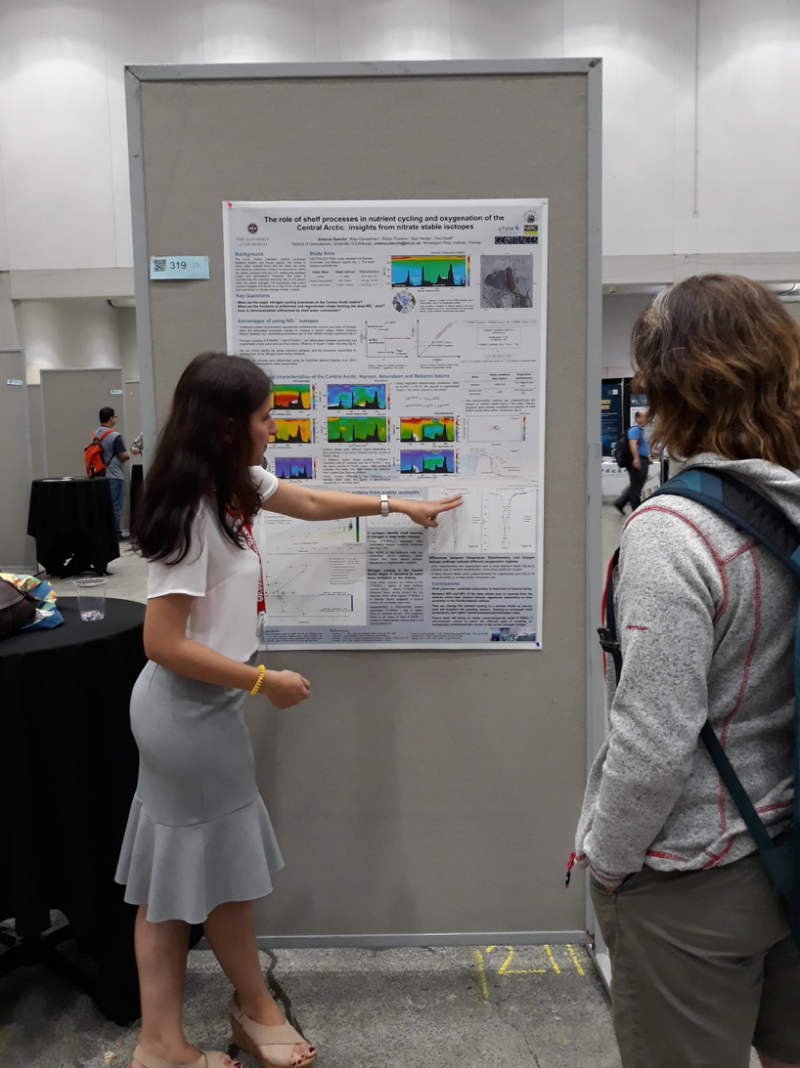Nitrogen Cycling in the Arctic Ocean: insights from nitrate stable isotopes (Goldschmidt)
Antonia Doncila
The University of Edinburgh, School of Geosciences

Goldschmidt 2018 has been an incredible experience, a great chance to network with my peers and meet other researchers working in my study area or employing similar techniques in other parts of the world. Every day, during the conference I attended presentations which were relevant to my research like: ‘On the origin of the deep N deficit in Baffin Bay: Insights from isotopic signatures of nitrate’ or ‘ The Transpolar Drift Influence on the Silicon cycle in the Arctic Ocean’ or ‘Greenland-sourced freshwater traced by radiogenic Neodymium Isotopes and Rare Earth Elements on the North-East Greenland Shelf’. These are just a few of the presentations whose authors I got to meet and we started discussions about innovative ways we could bring our research together.
My poster presentation was scheduled for the 15thof August, between 17:15 and 19:15 and was very successful. There I got the chance to present my work, on the role of Arctic shelves in the oxygenation of the Deep Arctic basins, to a broad range of scientists, from researchers working with isotopes to detect earth-like planets to researchers who have been working on the same transect as I did (collected during the German Geotraces Campaign 2015- PS94). This gave us the opportunity to analyse the whole Geotraces 2015 dataset and discuss what the different biogeochemical tracers are telling us about the Deep Arctic and its connectivity to the Arctic shelves as well as to update each other on the current research cruises that are taking place in the Arctic and on the future research projects developing in our study area.
During my poster presentation, another interesting encounter was with the research team working in the WANKEL Stable Isotope lab at Woods Hole (WHOI), which gave me the opportunity to contrast and compare the laboratory protocols I use in my project with theirs. This lead to fruitful conversations that benefited both parties and can potentially serve as solutions for future problems encountered in the lab while working with denitrifier bacteria.
The generous financial aid offered by the Challenger Society was recognized in the Acknowledgements section and by using the Challenger Society logo in the top right corner of my poster. This travel grant enabled me to experience a big, international conference, meet researchers who up until now I only knew from reading their papers, present my work, start new collaborations and last but not least, do all this invaluable scientific networking in a beautiful city, Boston.
Awardee Profile:
I am a 2ndyear PhD student researching the changing Arctic Ocean using stable isotopes of N and O. My aim is to gain a better understanding of the cycling of growth-limiting nutrients in the Arctic Ocean and how these are impacted by sea-ice melt. Ultimately, my goal is to build a isotopically constrained budget of nitrogen in the Arctic and examine the exports of nitrogen from the Arctic into the North Atlantic.
Latest News
Royal Society Publishing Photography Competition 2025
Please see a message from the Royal Society below:
We are delighted to announce that the 2025 Competition is now open for entries until 15 August for a chance to win £1000! The competition celebrates the power of photography in conveying the wonder of science happening all around us and photographs can be submitted in the categories of: Astronomy, Behaviour, Earth Science and Climatology, Ecology and Environmental Science, and Microimaging.
The competition is free to enter and open to anyone studying or working in science at graduate level or above. Category winners will receive a one-year membership to the Royal Photographic Society and the overall winner will receive a grand prize of £1,000. Find out more: https://bit.ly/RSPphotocomp
October 2025 MEDIN Workshop: Marine Data Management, Governance and the MEDIN toolset
The Marine Environmental Data and Information Network (MEDIN) are pleased to announce that registration is now open for the next occurrence of our popular free online training workshop: ‘Marine Data Management, Governance and the MEDIN toolset’ on the 13th – 17th October 2025 on OceanTeacher Global Academy.
Marine Data Management, Governance and the MEDIN toolset
The Marine Environmental Data and Information Network (MEDIN) and OceanWise are delighted to invite you to attend our popular free online training workshop: ‘Marine Data Management, Governance and the MEDIN toolset’ on the 19th – 23rd of May 2025.
